Chromatography
Why Are Dogs Friendly?
Aug 23 2017
With their wagging tails, lolloping demeanour and tendency to lick any human in sight, dogs are one of the friendliest animals on the planet. And now, a new study has revealed that it’s not just because they’re bought up around humans. Confirming that both nature and nurture play a role, a joint study by scientists from Oregon State University and Princeton has confirmed that dogs share a genetic link with overly-outgoing humans.
The link between genes and hyper-sociability
Using clues from humans with genetic disorders that makes them particularly friendly, animal behaviourist Monique Udell and geneticist Bridgett vonHoldt were able to pin down the genetic basis of the affectionate personalities that most dogs seem to possess. As well as finding variations in several genes that make dogs friendlier than wolves, they also pinned down genetic variations that make some dogs friendlier than others. For the medical industry it could represent an exciting new glimpse at the complexity of human behaviour.
It all started seven years ago when Udell and vonHoldt spearheaded a study designed to link genes to a hyper-sociability behavioural trait they believed was pivotal to dog domestication. They started by analysing the behaviour of 18 dogs, including purebreds and mixed breeds. They then compared it with the behaviour patterns of 10 captive, hand-raised wolves. Despite the fact that the wolves had been raised by humans the dogs were much friendlier.
The science behind love
After confirming the differences the researchers compared the behaviour to humans with Williams-Beuren syndrome, a developmental disorder that creates overly friendly and trusting personalities. The syndrome occurs when humans lose part of chromosome 7, which is the equivalent of chromosome 6 with dogs.
According to VonHoldt chromosome 6 DNA varied widely in dogs and wolves, with parts often inserted, deleted or duplicated. “Almost every dog and wolf we sequenced had a different change,” she explains. Humans with Williams-Beuren disorder also show great variation in the chromosome 7region, which plays an all-important role in hyper-social personality development. Specifically, disruption on a gene for a protein called GTF21 was widely associated with the most social dogs. Furthermore, a lack of disruption led to aloof, “wolfy” behaviour.
“Survival of the friendliest”
“The study is exciting because it provides such strong support for the ‘survival of the friendliest’ hypothesis of dog domestication,” comments Brian Hare, an evolutionary anthropologist who wasn’t involved in the study. He explains that ancient wolves with these gene disruptions were able to befriend humans and eventually replace fear with friendliness to create a new social bond.
From genetic variation to capillary isoelectric focussing, lab equipment plays a pivotal role in heterogeneity analysis. For a closer look at the latest developments, ‘Capillary Isoelectric Focusing – A Comparison of Different Carrier Ampholytes for Monoclonal Antibody Charge Heterogeneity Analysis’ compares the performance of four commercially available brands of wide-range pH 3 to 10 carrier ampholytes.
Digital Edition
Lab Asia Dec 2025
December 2025
Chromatography Articles- Cutting-edge sample preparation tools help laboratories to stay ahead of the curveMass Spectrometry & Spectroscopy Articles- Unlocking the complexity of metabolomics: Pushi...
View all digital editions
Events
Jan 21 2026 Tokyo, Japan
Jan 28 2026 Tokyo, Japan
Jan 29 2026 New Delhi, India
Feb 07 2026 Boston, MA, USA
Asia Pharma Expo/Asia Lab Expo
Feb 12 2026 Dhaka, Bangladesh



















